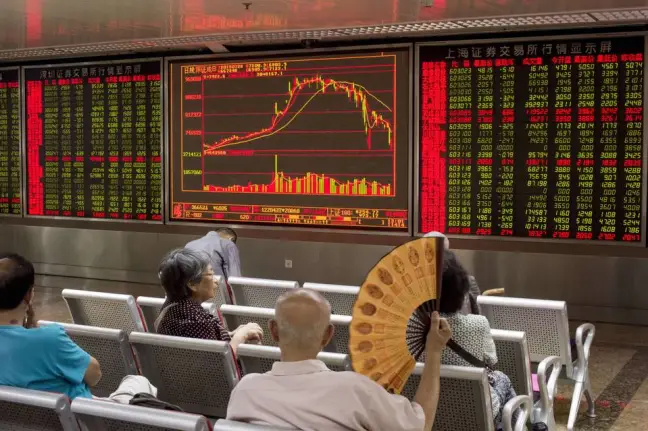“Shares have plunged 30% in three weeks, hundreds of firms have suspended dealings and fears that the slump will spill over into other markets are growing.”
“Global Stocks Falling as China’s Markets Plummet on “Black Monday”
News like this is all over the place. So, it is necessary for all of us to understand what exactly has been happening to China, how has this been happening and what effect is it going to have over the Indian markets.
It was just in June that China’s stock market was doing overwhelmingly well? The shares were increasing by 50% in the first five and half months of the year. This happened because investor’s had been piling in, which encouraged falling borrowing costs. In most of the other stock markets, investors are usually institutional, but in China, more than 80% are small retail investors. This particular rise was stimulated because there was a shift from property investment because of a clampdown by the government on excessive lending. There were laws that liberalized the stock market which made it easy for firms to offer shares to the public for the first time. Those five and a half months had seen a record number of businesses listed on the Shangai and Shenzen stock exchange.
Then what exactly has been happening to China? Simple; stock markets in China are tumbling. China’s situation is basically – falling GDP growth rates, falling commodity prices, huge amount of non-performing assets on the balance sheets of banks, falling commodity prices and finally reduction in the gross fixed investment viz., investment made on land, building and machinery; which in turn is leading to declining industrial production. To add to their woes, a sharp decline in the commodity prices such as gold and copper resulted in the stock market crash. The falling oil prices too are adding to the misery.
The entire logic is simple. When investments fall – production and prices fall – profits would fall – if the profits fall – stock prices of companies fall. It is important to know that many of the heavyweights are commodity manufacturers in the Shangai stock exchange, because of which the index is declining.
The next big question – Why did China devalue its currency? China had been responding to the fall in the stock market by buying stocks to support them from falling any further, but for how long will they do this? The banned short sales (Def.as per Investopedia – A market transaction in which an investor sells borrowed securities in anticipation of a price decline and is required to return an equal number of shares at some point in the future.) and new share issues, as well as put a lot of pressure on the 300 largest companies to buy back their stock, the authority also forced purchases of stocks by brokerage houses; but all of this was of little help.
China’s Yuan was on an upward track for a decade, during which the country’s economy grew to be the second largest in the world, because of which the Yuan gained global importance. The devaluation on the 11th of August, 2015 was the most significant downward adjustment that happened to Yuan since 1994. Yuan fell by almost one third. The main reason for the Chinese authorities to devalue was because this step would help drive Yuan towards a more market driven movement. The shift to a weaker Yuan will help flagging export at a time when all the other efforts have failed.
All the above said and done; what is the Black Monday which took place on the 24th of August, 2015? On 24th August, 2015 the Chinese markets fell through the floor, the Shangai Composite index fell by 8.49%. This came to be the single biggest day collapse since 2007!
China’s stock market wasn’t alone. Stocks in Hong Kong, Japan, Taiwan, Philippines, Singapore, Thailand, India, Europe and USA also tumbled. It was one of those few days where prices were moving so fast that it became difficult to get an idea of the momentum during the day.
Finally, it is important to understand the effect of this crash on the Indian markets. On the 24th of August, 2015 Rs. 7 lakh crore of investor wealth was just wiped out from the Dalal street and rupee fell to a two year low. Something of this sort usually invites a quick response from policy makers. While the investors were looking for relief from the governor’s side; Mr. Raghuram Rajan said that curbing inflation is essential for long term growth. In his statement at a FICCI banking conference, he said “it is not the role of the central bank to elevate sentiments unduly, to deliver booster shots to the stock market so that it can soar for a while, only to collapse when reality hits.”
Despite all the turmoil in the financial markets; a lot of analysts say that India is in a safe position. In an interview with the Economic Times, Mr. Kaku Nakhate – President and country head, Bank of America, Merril Lynch, said “Indian markets will get impacted by global risk off mood. However, fundamentally, India remains stronger on a relative basis when compared to emerging markets.” Even the RBI governor is confident that the macro economic conditions in India has seen an all-round improvement and this makes India hermetic to the inconsistency of the financial markets.
It therefore is clear that although India has witnessed a dramatic immediate reaction of the crash; there may not be a direct long term impact on India of the crash in China’s stock market.
Khusboo Shroff, VJIM, Student









